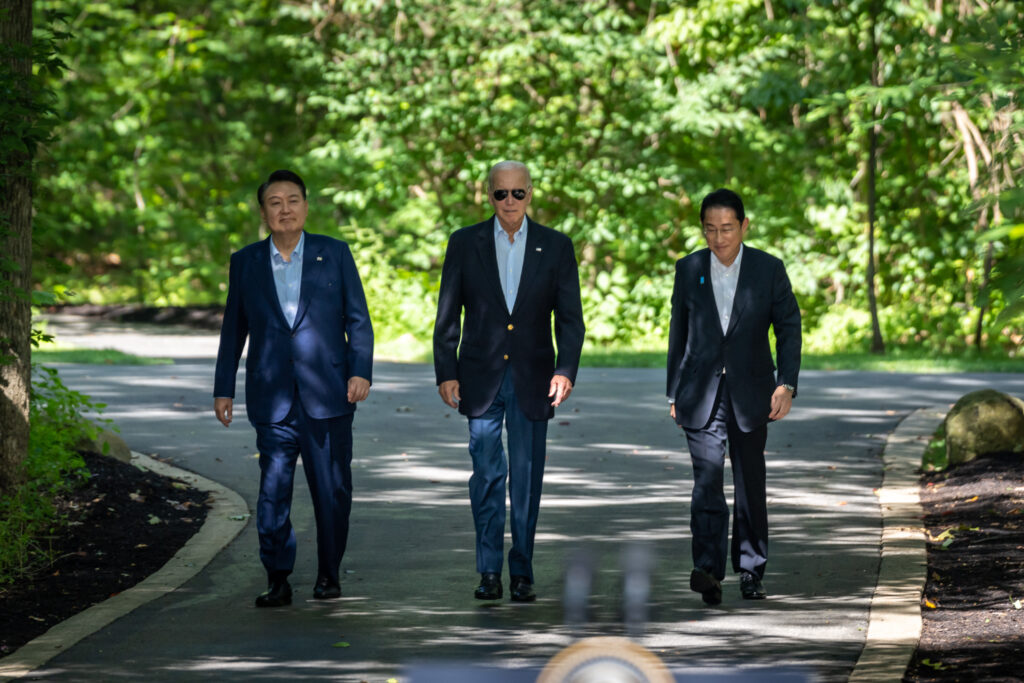The Peninsula
2023 in Review: The Deepening of Trilateral Cooperation

The past year has witnessed an unprecedented deepening of trilateral security cooperation between the United States, Japan, and the Republic of Korea (ROK). This is not a new goal of U.S. policy, and it has been long embraced, at least in principle, by both Japan and Korea. But the intensity, level, and sweep of trilateral cooperation we have seen in the past year has gone beyond any previous efforts.
Korea’s readiness to join a trilateral security partnership rests on the effort by both the United States and the ROK to strengthen the bilateral security alliance with the United States. This flows from a shift away from the emphasis on engagement with North Korea toward a more assertive insistence on denuclearization. This has been accelerated by Pyongyang’s escalatory actions; from the proclamation of a readiness to use tactical nuclear weapons to the heightened pace of missile testing, clearly aimed at putting targets in the ROK and in Japan at risk.
South Korea and the United States have responded to these aggressive steps by visibly tightening assurances of extended deterrence, including the formation of a new nuclear consultative mechanism and deployments of American systems that are strategically capable, such as long-range bombers, aircraft carriers, and ballistic missile carrying submarines. This was embodied in the Washington Declaration, issued at the conclusion of President Yoon Suk Yeol’s state visit in late April.
At the insistence of the United States, responses to North Korean actions have consistently taken the form of trilateral consultations and joint statements by officials of the respective foreign and defense ministries and national security officials. The intensity of trilateral cooperation goes well beyond what we have seen previously, though it rests on a long-standing desire for trilateral coordination on North Korea policy.
The meeting held between President Yoon and U.S. President Joe Biden focused not only on extended deterrence—and a companion reaffirmation by Korea of its commitment to the Nuclear Non-Proliferation Treaty—but also aligned Korea more clearly with American strategic policy on a global and regional scale. The declaration framed the alliance within the goal of preserving “peace and stability in the Indo-Pacific” and, in their joint appearance, both Presidents referred to a shared view of the Russian invasion of Ukraine.
The tightened bilateral alliance rests in turn, however, on the steps taken toward easing tensions between Japan and the ROK, leading to growing trilateral security cooperation. This was already clear in the trilateral statement issued in November, 2022 following a meeting in Phnom Penh. That statement featured an agreement to share tactical data on North Korean missile launches, within the framework of a trilateral information sharing agreement. It placed cooperation with the Indo-Pacific framework and joined in both condemnation of Russian aggression and a shared stance on “maintaining peace and stability across the Taiwan Strait.”
Yoon’s Washington visit followed directly from the exchange of visits by Yoon and Japanese Prime Minister Kishida and the steps taken by the ROK to offer a unilateral solution to the wartime history issue of forced labor. In June, the defense ministers of the three countries met in Singapore, and in July the three countries held a rare joint missile defense exercise involving Aegis destroyers from all three countries—aimed at practicing the detection and tracking of launches and sharing of real-time information. Trilateral aerial drills have followed and a plan to hold annual trilateral exercises is in place.
These steps culminated in the historic Camp David summit on August 18. The joint statement, “the spirit of Camp David,” proclaimed that the three countries shared a common approach to issues such as “geopolitical competition” (which appeared to be a thinly veiled reference to China), climate change, Russian aggression in Ukraine, and to North Korea’s “nuclear provocations.” The meeting fell well short of anything that resembles a collective security structure—though Chinese propaganda alleged that was the case—but it did create a new mechanism for trilateral consultation in response to “regional challenges, provocations, and threats to our collective interests and security.” Those threats were specifically identified as ranging from maritime security and cybersecurity to economic security issues such as supply chain resilience, technology security, and advanced technology development.
It remains to be seen how far and how fast this commitment for trilateral security coordination can advance. There exists considerable skepticism among the Korean public concerning relations with Japan, though there is strong support for the bilateral alliance, and within that framework, for improving ties to Tokyo.
Daniel Sneider is a Lecturer of International Policy and East Asian Studies at Stanford University and a Non-Resident Distinguished Fellow at the Korea Economic Institute of America. The views expressed here are the author’s alone.
Photo from the White House X Account
